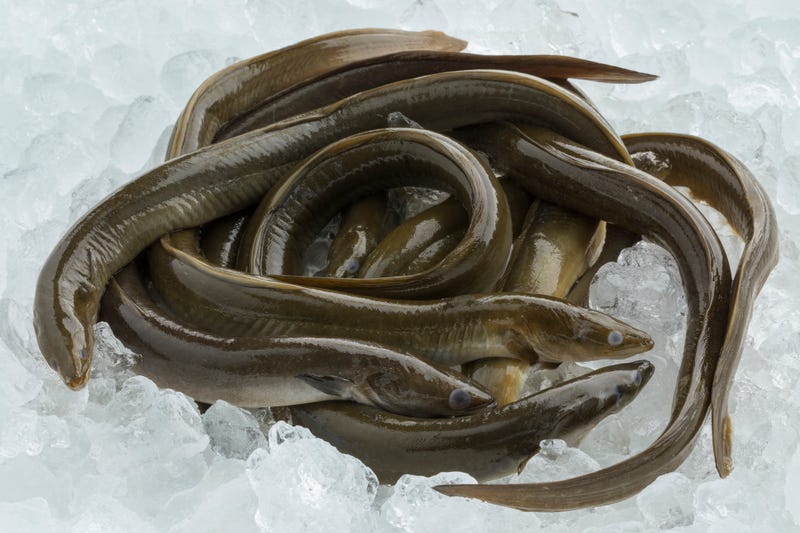
Do you ever wonder where the unagi in your sushi really comes from? You might want to start.
A seafood dealer based in New Jersey and eight of its employees have been charged with smuggling and other felonies for trafficking endangered European eels that ended up in sushi products, said the U.S. Department of Justice Friday.
According to the Zoological Society of London, European eels “once thrived in London’s rivers,” but populations began dropping in the 1980s. Now, the fish are considered “Critically Endangered” by the IUCN Red List of Threatened Species.
An indictment alleges that American Eel Depot Corporation of Totowa, N.J., the largest importer and wholesale distributor of eel meat in the U.S., conspired with other defendants to “unlawfully smuggle large quantities of live baby European eels out of Europe, to their eel-rearing factory in China.”
Defendants include: Yi Rui Huang, 47, of Oakland Gardens, N.Y.; Fen Liu, 45, of Oakland Gardens, N.Y.; Chao Jin Shi, 49, of Flushing, N.Y.; Guo Tuan Zhou, 45, of Woodhaven, N.Y.; Liang Chen, 33, of Fujian, China; Yundong Wei, 42, of Fuzhou, China; Xiajuan Huang Zhouyi, 46, of Changle, China and Hong Lee, 75, of Yuen Long, Hong Kong.
Once the baby eels were reared to maturity, the Chinese facility slaughtered and processed the eels for shipping to the U.S. to be sold as sushi products. Over a four-year period, the defendants imported approximately 138 ocean containers full of eel meat into the U.S. with a market value exceeding $160 million, the indictment alleges.
Of these containers, six were reportedly seized by the U.S. government.
These containers contained all or mostly European eel, mislabeled as American eel to avoid law enforcement detection.
“American eel fishing is highly regulated but still lawful in limited quantities in some areas,” the Justice Department explained. “As alleged in the indictment, the defendants knew the eels’ true species, knew what they were doing was unlawful, and intentionally lied to U.S. authorities to conceal the illegalities and avoid detection.”
In the past, there has been a crackdown on the poaching and smuggling of American eels and it has been illegal since 2010 to export European eels out of any European Union country. European eels are further protected by the Convention on International Trade in Endangered Species (CITES) wildlife protection treaty, enforced in the United States through the Endangered Species Act.
“Eel poaching and smuggling is one of the world’s biggest wildlife trafficking problems, based on both the number of animals and the amount of money that changes hands in the black market,” said the Justice Department.
Defendants have been charged with smuggling, conspiracy to violate the Endangered Species Act and Lacey Act violations through the department’s Environment and Natural Resources Division. The Lacey Act was enacted more than 120 years ago to ban illegal trafficking of fish, wildlife, or plants.
If convicted, each defendant faces up to 20 years in prison and fines up to $250,000. American Eel Depot Corporation could face a fine of $500,000, “twice the financial gain to the defendant or twice the financial loss to another, whichever is greater.”
“This case demonstrates the effectiveness and importance of the Endangered Species Act in cracking down on the international trafficking of protected wildlife,” said Assistant Attorney General Todd Kim of the Justice Department’s Environment and Natural Resources Division. “We will not allow United States-based businesses and their executives and associates to cause – and profit off of – the systemic decline of the world’s protected aquatic species.”
The Department of Homeland Security, the United States Fish and Wildlife Service and Customs and Border Protection investigated the case. Trial Attorneys Mathew D. Evans and Ethan Eddy of the Justice Department’s Environmental Crimes Section are prosecuting.
A federal district court judge will determine any sentence related to the case.
“An indictment is merely an allegation and all defendants are presumed innocent until proven guilty beyond a reasonable doubt in a court of law,” said the Department of Justice.


